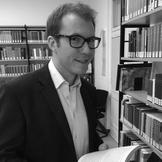Dr. Philip Bockholt

Freie Universitaet Berlin
Global Humanities Junior Research and Teaching Stay at The Hebrew University of Jerusalem
Philip Bockholt was a doctoral candidate at the Berlin Graduate School Muslim Cultures and Societies at Freie Universitaet Berlin, where he completed his PhD in 2018. He studied History and Islamic Studies in Bochum, Münster, Jerusalem, Cairo, Istanbul and Tehran, and received his M.A. degree in Islamic Studies from Freie Universitaet Berlin in 2013. His main academic interests are in history and historiography of the Islamic world in premodern times. The subject of his dissertation is the “Habib al-siyar”, a history book written in Persian at the beginning of the 16th century, and its manuscript tradition.
Teaching Slot within the Summer School 2018:
Same Same But Different? How Books were Copied and Altered in the Premodern Islamic World
Whenever researchers need information about something that happened in the past, be it political, economic, religious, or otherwise, they will have a look at the sources first. This normally means that they refer to printed editions of texts which contain the information they are looking for. So-called “critical editions,” editions of texts that have a thoroughly prepared footnote apparatus, and provide information about which manuscripts were used for making the edition, are preferable to “noncritical” ones, which lack this information. Neither of these editions – both contain a polished version of the text prepared for the modern reader – can provide insights into how texts (and thus, knowledge) were transmitted in the manuscript age, when books were copied by hand and left space for interpretation and alteration. In the Islamic world, this era only ended in the early 19th century, when printing presses became widely available.
Recent studies on single manuscripts, various manuscripts of one work, or premodern libraries have pointed out that the transmission of knowledge in the Islamic world was far more complicated than formerly assumed. Instead of copying texts word by word, one can find various alterations made to a manuscript of a certain text. Very often, e.g. in history books, these changes went back to religious and political developments in the Islamic world, which had effects on how a book was copied.
The seminar will discuss various examples of manuscripts in Arabic and Persian, which will throw light on the question of how texts were copied and read in the Middle East from the 10th to 19th centuries. This leads to the broader question of how certain modern researchers can be about what actually happened, given that the sources they use were possibly altered by later scribes.
In the Shadow of History: Cultural Brokers from the Middle East in Early Modern Times
In his research project, Philip Bockholt will shed light on cultural brokers from the Middle Eastern who lived in various European cities and worked as language teachers, translators, and intellectuals in the early modern age, and have stood in the shadow of history until recently. He will particularly pay attention to the Syrian Christian scholar, translator, and language teacher Salomon Negri (Sulaymān al-Aswad, lived ca. 1665-1729). He aims to reconstruct Negri’s vita and transnational networks, in order to highlight him as a link between Europe and the Ottoman Empire. As such, his project is a contribution to the thriving field of knowledge transfer – in this case, knowledge about the other – across the Ottoman Empire and various European countries.
